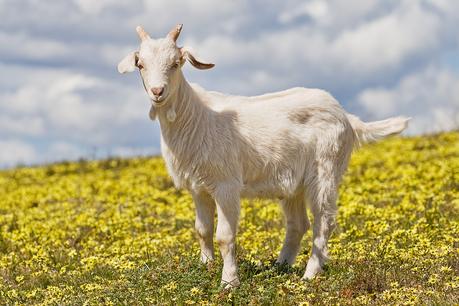
Finding the best organic baby formula has been a hot topic for many of you - and understandably so! If you're using formula for any number of totally legitimate reasons (breastfeeding is too mentally & physically exhausting / painful, your baby is allergic to a protein in your breastmilk, you adopted or had a surrogate, or you need to supplement just because!) - you want to make sure what you're feeding your babies and toddlers is the best.And, it's so hard to sort through the millions of types of baby formula on the market!
If you're looking for a comprehensive guide to the best organic baby formula, I've outlined them here. But this post is dedicated to the differences between cow & goat milk formula, and the pros & cons of each! Also, here is my best goat milk formula guide, which ranks all of the options in a handy chart.

So what's the bottom line on goat milk formula? Is it healthier than cow's milk? The answer is: It depends. Goat milk can be better, but a variety of factors will determine whether it's better for your baby.
#1: Nutritionally, goat milk & cow milk are similar. Goat milk is higher in some vitamins and minerals, cow's milk has more folic acid and B12 than goat milk. This doesn't matter much for formula though, because all formulas are fortified so they include the right balance of vitamins & minerals to mimic breast milk. Some studies suggest that the nutrients in goat's milk are easier to absorb than cow's milk, which might give goat's milk a slight benefit over cow's milk formulas.
#2: Organic standards. This is very important - but neither goat or cow milk wins here - it all depends on the farm and the producer (e.g. goat milk isn't going to be organic "more often" than cow's milk or anything like that).
#3: Allergenic differences. Goat milk is said to be a hypoallergenic alternative to cow's milk because it's less likely to be troublesome for babies who are sensitive to cow's milk proteins specifically. Some other factors to consider:
- Goat milk fat contains significantly higher amounts of easier-to-digest short- and medium-chain fatty acids compared to cow milk. So, some babies do better on goat milk formula because the composition of the fats/proteins is different than in cow's milk formula.
- Goat milk doesn't contain the type of casein protein, alpha-S1, that tends to be problematic in cow milk - which gives it a leg up here.
- Goat milk also has less lactose than cow's milk, but most goat milk formulas add lactose as a carbohydrate source to make up for this difference.
- Note: If your baby has a diagnosed lactose or dairy allergy (confirmed cow milk protein allergy -CMPA), goat milk will trigger an allergic reaction in the same way that cow's milk would!
#4: Protein composition. Many of you have asked me whether goat milk formula is dangerous for babies because goat milk contains a very different whey-casein ratio than cow's or breast milk. But most goat milk baby formulas will add whey to balance this out - and my top goat milk formula - Kabrita USA - mimics the whey-casein ratio of breastmilk! Also, goat milk protein forms a smaller, softer, and looser curd in the gut than cow milk. And, it is degraded faster than cow milk protein.
Given all of these factors, goat milk formula can be a good option for babies who are having trouble digesting cow's milk formula and don't have a diagnosed CMPA. But before choosing any formula, it's important you talk to your pediatrician first.
There is obviously no "perfect" formula out there, but I look at the following factors when choosing the best formula: 1) Organic standards, Non-GMO, no added sugars, types of oils/fats added, hexane-extracted DHA/ARA, and any problematic synthetic preservatives or nutrients. Against this criteria, Kabrita USA gets really close to having an ideal composition for their formula, and you can see details on the rest of the goat milk formula options here!

